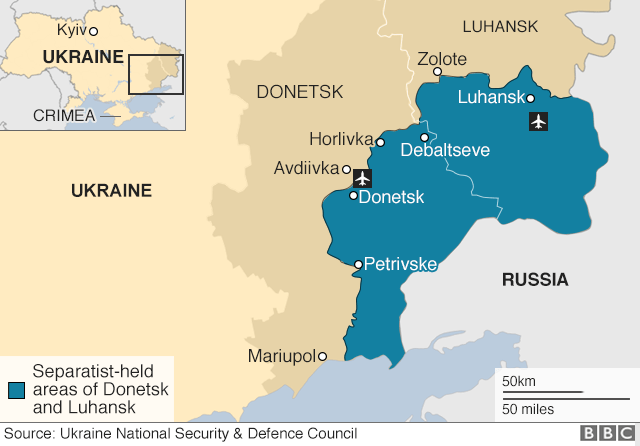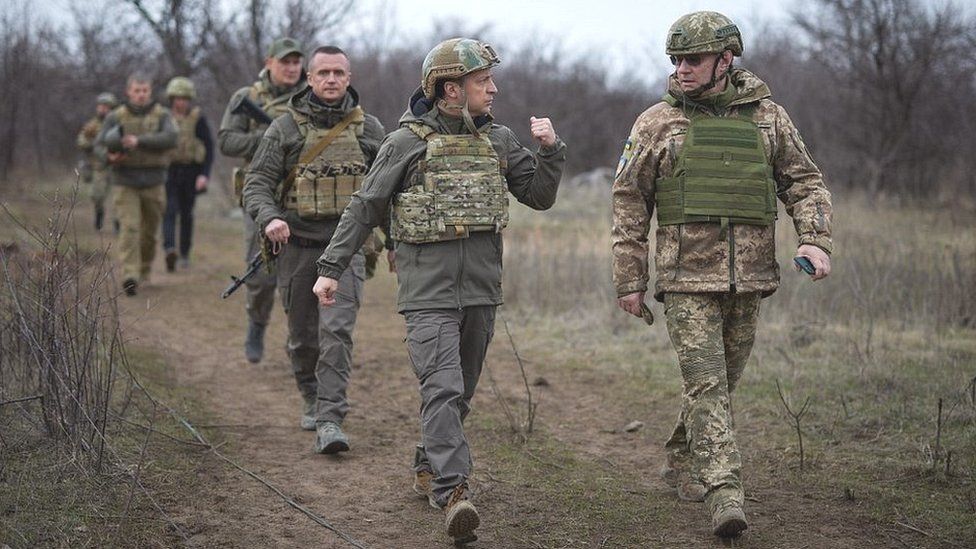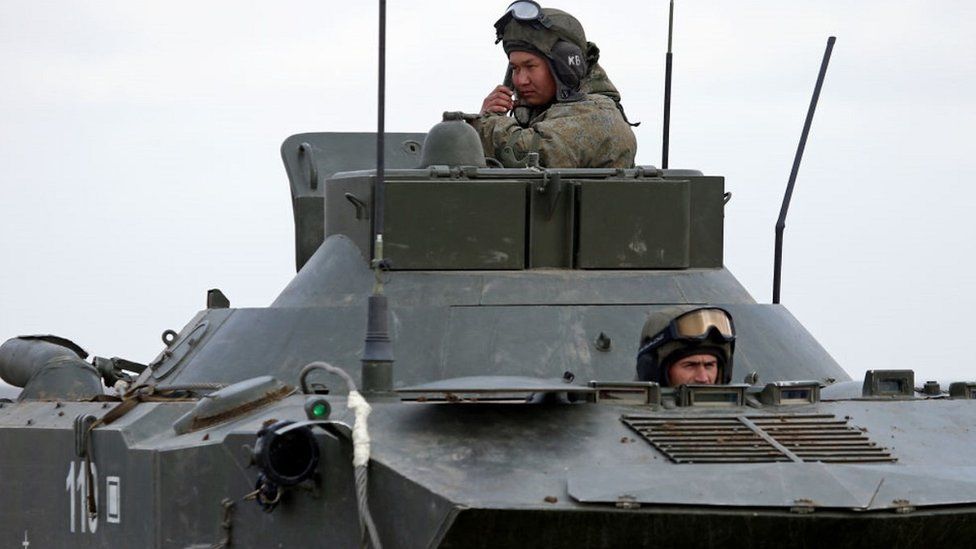Ukraine Under Duress of Invasion Threats
 |
In the first week of April, Russia had begun to build up its military presence at the border with Ukraine. This was a reaction to Ukraine's "provocations" — which were aimed at escalating the conflict between Russian separatists and Ukrainian government troops, the Kremlin said. According to observers sent by the Organization for Security and Cooperation in Europe (OSCE), there was no provocation. |
"The president's office, of course, made a request to speak with Vladimir Putin.""We have not received an answer yet and we very much hope that this not a refusal of dialogue."Julia Mendel, spokesperson, Ukrainian President Volodymyr Zelensky"Questions are being asked about what Russia is doing on the border with Ukraine.""The answer is very simple. We live there, it's our country.""But what is the United States doing thousands of kilometres from its own territory with its warships and troops in Ukraine?"Russian Foreign Minister Sergei Lavrov"The United States is our adversary and does everything it can to undermine Russia's position on the world stage."Deputy Foreign Minister Sergei Ryabkov

Sergei
Lavrov was on a visit to Egypt when he expressed his sentiments
respecting Russia's ownership of Ukraine. The Middle East is not exactly
next door geographically to Russia. And nor is Syria a neighbour of
Russia. But Russian President Vladimir Putin and the Kremlin feel
perfectly at ease with a deep sea port off the Syrian coast and an
airport for their warplanes in Syria. The warplanes are on a mission to
secure the entire geographic region to return it from the hands of Sunni
Syrian militias striving to unseat Syria's Shiite Alawite President
Bashar al Assad.
In
aid to President Assad's regime, Russian warplanes bomb hospitals and
medical clinics in rebel-held territory, exacting a terrible price in
human lives held to be 'terrorists' and 'scum' by Assad and supported in
that designation by Putin. Moscow, of course, is prepared to bomb and
terrorize not only foreign populations fighting for equality in their
country of birth, but Ukrainian citizens loyal to Ukraine as an
independent sovereign nation. The historical bondage and occupation of
Ukraine is a matter that time righted.
President
Putin seems himself as a Russian icon of 'unification', eventually
restoring what Greater Russia lost with the dissolution of the Union of
Soviet Socialist Republics, with a mission to bring Russia back to its
past days of glory and subordination of its neighbours to Russian
control. Georgia was treated to its own very special humiliation with
the loss of two of its provinces thanks to Russia, and Estonia was
treated to an example of the mischief Moscow could guarantee through
cyberattacks.
Now,
ethnic-Russian 'Ukrainians' whose aspirations are to return Ukraine to
Russian domination have their plans supported by Russian arms and
intervention in the Donbass region, where Moscow saw fit to 'extract'
the Crimean peninsula from Ukraine, claiming it as Russia's original
territory, giving Russia a firm grasp of Eastern Ukraine. Russia's
military buildup on the border between Russia and Ukraine is a strictly
defensive move, its purpose to 'defend' the rebellious ethnic
Russian-speaking Ukrainians against Ukrainian oppression.
 |
A tank fires during control checks of Russia's armed forces. On both sides of the Russian-Ukrainian border, troops are testing the combat readiness of their weapon systems. This thumbnail was taken from a video released by the Russian Defense Ministry. |
Kyiv,
in accusing the Kremlin of planning another invasion to violently
restore Ukraine to the bearish embrace of Russia, also appealed to NATO
to permit it the formality of membership, which would automatically
trigger NATO defensive involvement should an invasion take place. NATO's
involvement to the present has already been to great effect,
establishing member-battalions in key near-abroad states as a warning to
Russia that it is committed to the defence of Ukraine.
The
recent movement of Russian troops and materiel to the eastern border of
Ukraine has raised alarm not only in Ukraine but throughout the West,
with U.S. Secretary of State Antony Blinken and NATO Secretary-General
Jens Stoltenberg discussing "the immediate need for Russia to cease its aggressive military buildup".
Which Russia translates as an intolerable interference in its internal
affairs by the Western alliance threatening Russia's historical
alliances and the movable feast of its geography.
Russia's
response is to point out its inalienable right as a free and sovereign
nation to move its forces about for strictly 'defensive' purposes; the
right of any country. And while Ukrainian President Volodymyr Zelensky
as a nation whose sovereignty is disputed by Russia, strives to react
calmly and rationally, inviting his Russian counterpart to dialogue and a
reasonable effort to work through the 'misunderstanding' Russia labours
under, his request is ignored.
 |
| President Zelensky (front L) visited Ukrainian troops in the conflict zone on 8-9 April EPA |
Much
as is U.S. President Biden's request for a one-on-one meeting between
himself and Vladimir Putin whose response to that invitation was the
evasive rejoinder that Mr. Putin would give the suggestion consideration
before responding in the affirmative, if such be the case. Russia,
according to Mr. Zelensky's spokesperson, has 40,000 troops deployed on
the eastern border of Ukraine, with an additional 40,000 troops in
Crimea; 50,000 of the total representing new deployments.
Two
U.S. warships are scheduled for arrival in the Black Sea this week,
responding to what U.S. and NATO officials characterize as the largest
massing of Russian forces -- thousands of combat-ready troops -- since
Moscow saw fit to relieve Ukraine of Crimea. In President Biden's offer
to meet with President Putin, the goal was to secure "a stable and predictable relationship" with Russia, the meeting conceivably addressing "the full range of issues" the two world powers face.
The
Kremlin revealed the result of the call between Mr. Biden and Mr. Putin
was the American President explaining his wish to normalize relations
for co-operation on arms control, Iran's nuclear program, Afghanistan
and climate change. From the time decades ago when George W.Bush met
with the then-new President of Russia, declaring Vladimir Putin to be a
man he could do business with, to the present, where a new cold war has
been reestablished, the situation has evolved to Moscow pushing back
against unacceptable U.S. interference in its geographical sphere of
influence.
 |
| Russian units have been on exercises in Crimea Getty Images |
Labels: Conflict, Ethnic Russian Ukrainian Rebels, Invasion, NATO, Russia, Threats, Ukraine, United States

<< Home